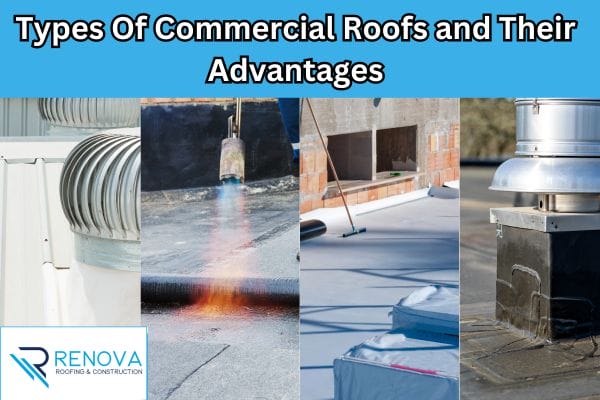Navigating the many choices for commercial roofing can feel overwhelming. There are lots of different materials and costs to consider. But don’t worry! This guide will explain the different types of commercial roofs and their benefits, providing helpful tips so you can make a choice that suits your needs.
As we start describing different types of commercial roofs, it’s crucial to remember that each variety is designed with specific considerations in mind. Naturally, the choice between them will greatly depend on factors such as geographical location, budget constraints, aesthetic preferences, and functional requirements, which we will cover later in the blog.
Single-Ply Roofing Systems
These single-layer roofing systems, without a doubt, are the most common type of commercial roof used over the last few years.
Single-ply roofs are flexible sheets of synthetic material used for flat or low-sloped roofs, offering an efficient and durable option for roof replacements. These usually come in the form of roofing rolls, which allows for easy application.
Here are some of the most common single-ply commercial roofs:
EPDM Roofs:
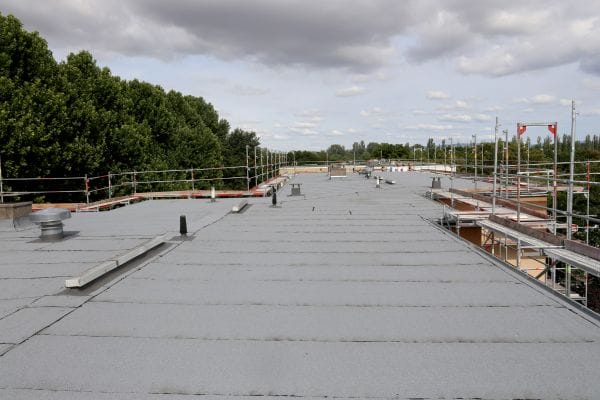
Let’s start with the material that has been the top choice of commercial roof owners for a decade, EPDM.
Also called rubber roofs, EPDM stands for Ethylene Propylene Diene Monomer, and is a single-ply membrane material characterized by supreme durability and resistance against temperature extremes. It is commonly used for low-slope buildings like large warehouses or industrial complexes.
Benefits of EPDM
- The single-ply membrane provides an easy installation process, along with durable resistance against sunlight exposure and Ozone depletion.
- Some variants even include reinforcement layers that enhance puncture resistance, making it a robust roofing choice overall.
- EPDM roofs often prove to be a budget-friendly choice upfront. The installation expenses associated with EPDM tend to be less in comparison to other roofing solutions, like TPO and PVC.
TPO Roofs:
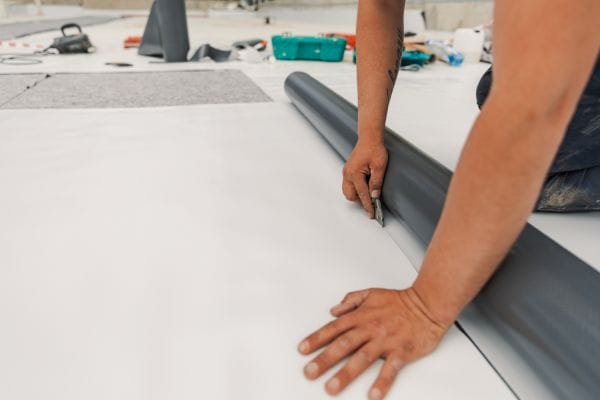
Thermoplastic Polyolefin, otherwise known as TPO, is another popular single-ply roofing membrane that has gained significant traction in the commercial roofing industry. TPO roofs are known for their exceptional resistance to UV rays, weathering, and punctures, making them a durable and long-lasting option.
Benefits of TPO:
- One of the most notable advantages of TPO roofs is their energy efficiency. The reflective white surface of TPO membranes reduces cooling costs by reflecting a significant portion of the sun’s heat, leading to lower energy bills.
- Additionally, TPO roofs are environmentally friendly, as they are typically made from recyclable materials and can often be recycled at the end of their lifespan.
- TPO roofs also offer excellent resistance to chemicals, making them suitable for various commercial and industrial applications.
- While the initial cost of installing a TPO roof may be higher compared to EPDM, the material’s superior energy efficiency and long-term performance can offset these costs over time.
Also Read: EPDM vs. TPO: Which Is Better For Your Commercial Roof?
PVC Roofs:

PVC is short for Polyvinyl Chloride, and these roofing systems have become an increasingly popular choice for commercial and industrial buildings. PVC roofs consist of a single-ply membrane made from rigid plastic polymer that is designed to be exceptionally durable and long-lasting.
Benefits of PVC:
- One of the major advantages of PVC roofs is their ability to withstand extreme temperatures, both hot and cold.
- They are also highly resistant to wind, fire, and chemical exposure, making them a reliable choice for various commercial and industrial applications.
- PVC roofing membranes are easy to install and can be custom fit to complex roof designs.
- PVC is also known for its reflective properties, which can contribute to energy savings by reducing cooling costs.
A Comparison Between TPO & PVC Roofing Membranes
PVC and TPO are both thermoplastic materials that make attractive options for flat and low-slope roofing systems. While many people consider them the same, this is not the case.
Both types provide exceptional resilience against chemical exposure, UV radiation, and harsh weather alongside high wind loads, which is perfect for both hot and cold climates.
While PVC has been around longer boasting fire-resistant properties, TPO offers better energy efficiency due to its highly reflective surface that redirects the summer sun away from roofs, reducing cooling costs significantly.
Both membranes also possess heat-welded seams that contribute to their durability and provide enhanced protection from leaks.
Multi-Ply Roofing Membranes
Though single-ply roofing membranes are all the rage now, there are other great options to look at. These roofing systems use more than one layer of roofing material, hence the name multi-ply roofing systems since these roofs are composed of three or more layers
Let us look at some of the best types of commercial roofs that use multiple layers.
Built-Up Roof (BUR Roof)
A built-up roof (commonly abbreviated as BUR) has been a standard for commercial roofing for over 100 years. This system consists of alternating layers of fabrics or reinforcement mats called “plies” sandwiched between bitumen (asphalt or coal tar). The top layer typically features gravel or glass fiber that is embedded in hot asphalt, providing an appealing finish.
Benefits of a Built-Up Roof:
- The durability and longevity offered by BUR are second to none. Capable of warranties lasting up to 30 years, these roofs provide excellent protection against water, UV radiation, and harsh weather conditions.
- Additionally, they require minimal maintenance efforts and deliver impressive insulating properties, which are two aspects highly appreciated by building owners.
- With a history dating back over a century, BURs have a proven track record of performance and reliability. This long history of use in various climates and conditions provides confidence in their effectiveness.
Modified Bitumen Roofs
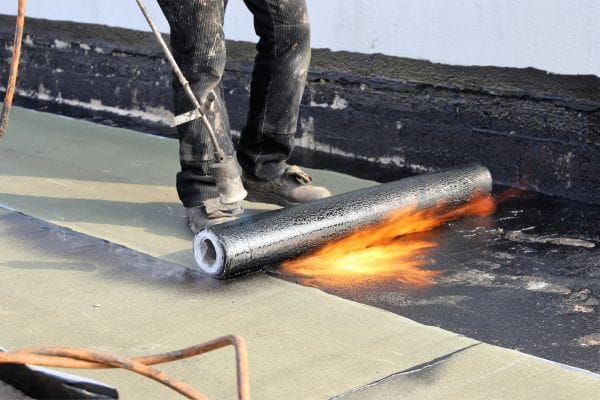
A modified bitumen roofing system is another popular type within the larger family of commercial roofs. Similar to BUR in construction, this option differs due to polymer modifiers added to the asphalt. It grants more flexibility and expands its temperature range, rendering it suitable for a variety of weather conditions.
Benefits of a Modified Bitumen Roof
- These roofs provide enhanced elasticity and flexibility compared to traditional BUR systems. This means that they can resist potential structural movements and thermal shocks remarkably well.
- Furthermore, they have granular top surfaces that reflect UV rays while providing additional durability and lower maintenance requirements.
- Since modified bitumen roofs use multiple layers in its construction, it makes the system heavier, allowing it to fare better against foot traffic and punctures.
Metal Roofs:
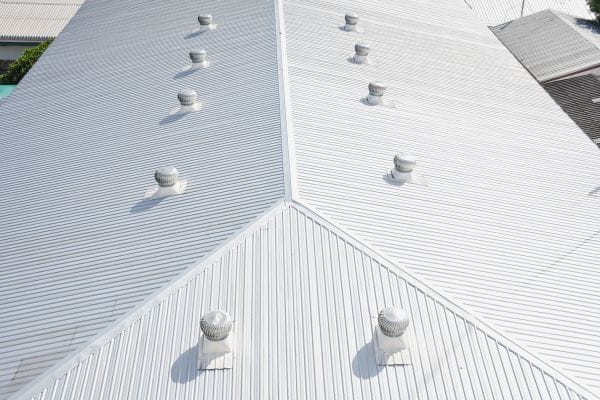
Moving on from 2-ply and 3-ply roofing systems, we talk about another common category: metal roofs. The type of metal used can range from steel and aluminum to copper and zinc alloys. Besides standing out aesthetically, metal roofs offer impressive durability with resistance against wind-driven rain while being relatively lightweight.
Benefits of a Metal Roof:
- Metal roofing systems boast a lifespan exceeding 50 years and exhibit energy efficiency due to their reflective surfaces, which decrease cooling costs during summer months.
- They also contribute to sustainability since many new metal roof products contain over 50% recycled material, and their possibility of full recyclability at the end of their life sets them apart.
- Metal roofs offer tremendous versatility. You can install different types of metal roofs, such as corrugated or standing seam metal roofs, and choose from various colors too.
Green Roofs:
Green roofs are a newer option and are an innovative addition for those who want an eco-friendly option that also offers several benefits. These roofs are installed directly onto roof decks with a waterproofing system. The vegetation is supported either by loose-laid dirt or specially-designed trays.
Benefits Of Green Roofs
- Green roofs not only provide natural insulation but also improve thermal regulation.
- Manages stormwater runoff while enhancing air quality, which reduces heating and cooling costs, adding an economic dimension to their environmental appeal.
- Increases property value by adding to the appearance.
Factors Influencing Your Material Choice
When considering installing or replacing a commercial roof, several key factors influence the decision-making process:
Durability:
One important consideration is how long the roof will last under varying weather conditions. High-quality materials tend to have considerably longer lifespans compared to less durable options.
Energy Efficiency:
In today’s environmentally-conscious world, energy efficiency carries significant weight too. Some roofing materials reflect sunlight better than others, which helps maintain a building’s temperature and reduces the need for air conditioning.
Cost:
Budgetary constraints always play an essential role. It’s a crucial balance between the initial investment and the expected life cycle of the material you choose. Typically, enhanced longevity coupled with fewer maintenance requirements justifies higher upfront expenses.
Get Quality Commercial Roofing Services On The Gulf Coast
Remember, the right commercial roof depends on your specific needs. A well-installed and maintained roof can provide long-term benefits such as energy efficiency and cost savings. This makes choosing the right roof a smart investment. We hope that our guide has helped you feel more informed about the choices you have when it comes to commercial roof replacement. If you still have any doubts or want to move forward with roof replacement, make sure to connect with our experts. Our team at Renova Roofing & Construction offers the best commercial roofing services in Mississippi, and also serves other parts of the Gulf Coast such as Alabama and Louisiana. Contact us today at (601) 647-3433.

